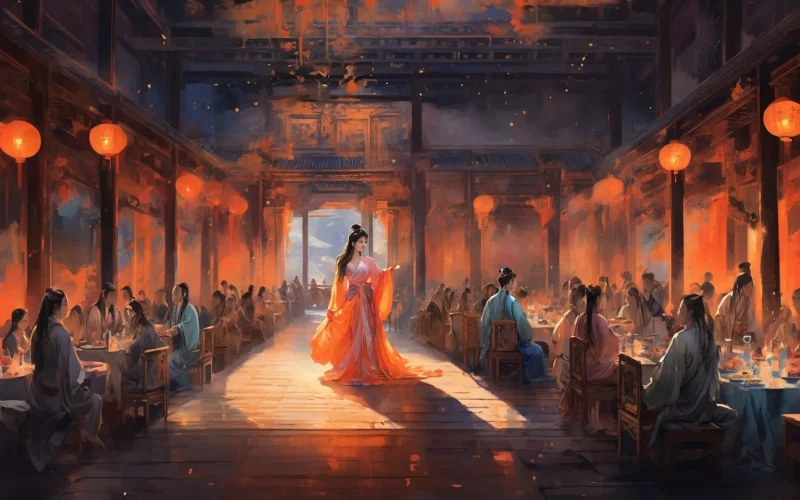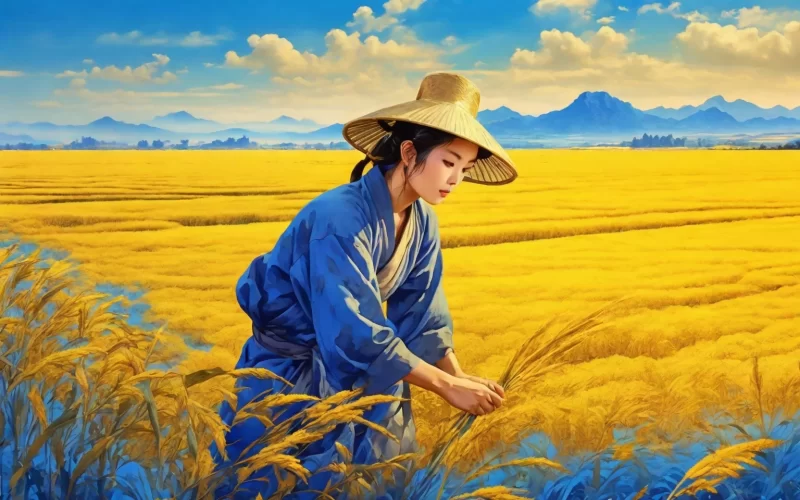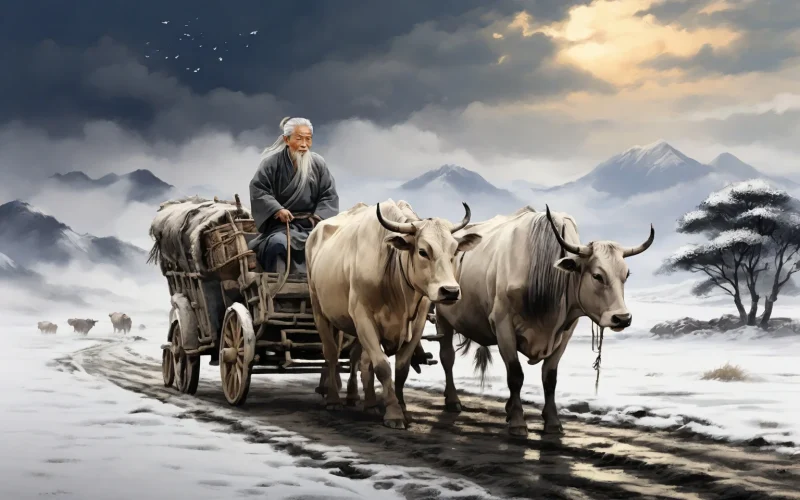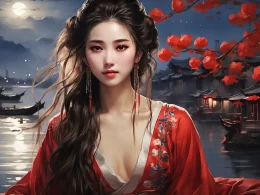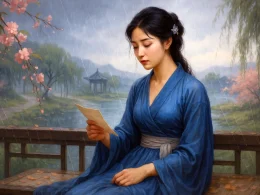The King of Qin rode the tiger to eight Poles high:
His sword shone in the air and brightened the blue sky.
His driver struck the sun with a glass-breaking sound;
All were reduced to ashes on the battleground.
Stars were invited to drink wine poured from dragon's head;
The golden pipa played at night would grieve the dead.
The rain treading on Dongting Lake would blow the lute;
The King ordered the moon to go back to its root.
Silver cloud on cloud made the crystal palace bright;
The gate-keeper announced it was still early night.
The phoenix in the tower sang her bewitching song;
Clear fragrance of ladies' silken dress wafted long.
The dancers drank to his health of a thousand years.
From the candles on the fairy trees rose smoke light.
From the lutist's drunken eyes streamed down copious tears.
Original Poem:
「秦王饮酒」
李贺
秦王骑虎游八极,剑光照空天自碧。
羲和敲日玻璃声,劫灰飞尽古今平。
龙头泻酒邀酒星,金槽琵琶夜枨枨。
洞庭雨脚来吹笙,酒酣喝月使倒行。
银云栉栉瑶殿明,宫门掌事报一更。
花楼玉凤声娇狞,海绡红文香浅清,
黄鹅跌舞千年觥。
仙人烛树蜡烟轻,清琴醉眼泪泓泓。
Interpretation:
This poem The Qin King Drinks Wine was written by Li He. On the surface, it depicts the Qin King drinking and enjoying himself, but it actually uses the Qin King's life to subtly criticize the extravagant and indulgent behavior of Emperor Dezong of the Tang Dynasty, Li Shi. Through this poem, Li He criticizes the incompetent rule of Emperor Dezong, mocking his hedonistic lifestyle and neglect of governance. Li He's poetry often carries a strong critical spirit and deep emotions, and in this poem, he uses exaggerated depictions to portray the absurd lifestyle of the Qin King.
First Couplet: “秦王骑虎游八极,剑光照空天自碧。”
(The Qin King rides a tiger to roam the eight corners of the world, and the sword's light illuminates the sky, turning it into a clear blue.)
These two lines vividly describe the imposing figure of the Qin King. "Riding a tiger to roam the eight corners" conveys his strength and intimidation, with the tiger symbolizing power and ferocity. The phrase "the sword's light illuminating the sky and turning it into clear blue" uses exaggeration to create an image of invincibility, comparing the Qin King's might to the vast and clear sky, emphasizing his dominance and grandeur.
Second Couplet: “羲和敲日玻璃声,劫灰飞尽古今平。”
(Xi He strikes the sun with a glass-like sound, sweeping away the ashes of disaster, bringing peace from ancient times to the present.)
In these lines, the poet uses the mythological figure of Xi He to symbolize the order of the universe, portraying the Qin King as having control over the heavens and earth. The metaphor of "striking the sun with a glass-like sound" exaggerates the Qin King's sword energy as so powerful that it could alter the movements of the sun and moon. The image of "ashes of disaster flying away" further emphasizes peace under his reign, as if all turmoil has been quelled.
Third Couplet: “龙头泻酒邀酒星,金槽琵琶夜枨枨。”
(A wine jug in the shape of a dragon's head pours out wine, inviting the stars of wine to join; the pipa in a golden trough emits a crisp sound at night.)
These lines describe the luxurious drinking feast, with the "dragon's head pouring out wine" suggesting the wine flows like a torrent, creating a lavish atmosphere. The "pipa in a golden trough emitting a crisp sound at night" conveys the vibrant and extravagant scene, where the musical notes heighten the opulence of the banquet.
Fourth Couplet: “洞庭雨脚来吹笙,酒酣喝月使倒行。”
(The rain on Dongting Lake blows the sound of the sheng, and in drunkenness, the moon itself is made to reverse its course.)
These lines create a dreamlike scene with the music of the sheng carried by the rain and the absurd image of the moon reversing its course, symbolizing the madness and chaos of the Qin King's indulgent life. The exaggerated portrayal of the moon's reversal in drunkenness emphasizes the absurdity of the situation.
Fifth Couplet: “银云栉栉瑶殿明,宫门掌事报一更。”
(Silver clouds pile up, lighting up the jade palace; the palace gatekeeper reports that it is the first watch.)
These lines depict the ongoing feast in the palace, with the silver clouds stacking up in the night sky, illuminating the palace. The gatekeeper falsely reports the time, signaling that the revelry continues into the late hours, symbolizing the Qin King's lack of restraint and excess.
Sixth Couplet: “花楼玉凤声娇狞,海绡红文香浅清,黄鹅跌舞千年觥。”
(In the flower tower, the jade phoenix sings with both sweetness and fierceness; the sea silk emits a faint, clear fragrance, and the yellow geese dance clumsily, their movements clashing with the eternal wine cups.)
These lines describe the extravagant and chaotic nature of the banquet, where the jade phoenix's song is both enchanting and wild, and the fragrance of the sea silk suggests a subtle but unstable atmosphere. The clumsy dancing of the yellow geese and the constant clashing of wine cups reflect the confusion and decay of the celebration, symbolizing the collapse of power and pleasure.
Seventh Couplet: “仙人烛树蜡烟轻,清琴醉眼泪泓泓。”
(The immortal's candle tree burns with light wax smoke, and the clear sound of the qin accompanies drunken eyes filled with tears.)
These lines depict the end of the banquet and the sorrowful atmosphere. The light wax smoke from the candle tree has a mystical aura, while the "qin's clear sound accompanying drunken tears" expresses a sense of resignation and sadness, marking a melancholic end to the extravagance.
Writing Style:
In this poem, Li He uses abundant exaggeration, symbolism, and metaphors to create a highly expressive and impactful language. Through extreme exaggeration of the Qin King's grandeur, the poem initially highlights his power and invincibility. However, as the poem progresses, the tone shifts to depict indulgence and decay, criticizing the Qin King's hedonism and neglect of governance. This transition cleverly reveals the poet's deep reflection on the reality, showing his dissatisfaction with the corrupt and luxurious life of the ruler.
Overall Analysis:
The Qin King Drinks Wine uses the Qin King's power and indulgence in drinking as a theme, skillfully combining historical figures with contemporary satire, constructing a vivid scene. The first few lines set the stage with the Qin King's might, but the subsequent lines through drunkenness and music depict his descent into decadence and inaction. Li He uses exaggerated rhetoric to showcase the Qin King's brutality and absurdity, criticizing the ruler's corruption. The final lines, describing the "clear qin's sound and drunken eyes filled with tears," create a melancholic and repressed atmosphere, subtly expressing the poet's deep regret and dissatisfaction with this absurd lifestyle.
Insights:
This poem not only exposes the luxurious lifestyle of a corrupt ruler but also alludes to the abuse of power and imbalance in governance. It serves as a reminder that rulers should not indulge in pleasure but should remain focused on governance and the well-being of their people. The poem also warns people not to lose themselves in the face of power, urging vigilance and clarity to avoid falling into a life of extravagance and ultimately losing their true selves.
Poem translator:
Xu Yuan-chong (许渊冲)
About the poet:
Li He (李贺), circa 790 - 817, was a native of Luoyang, Henan Province, and a Romantic poet of the Middle Tang Dynasty.






